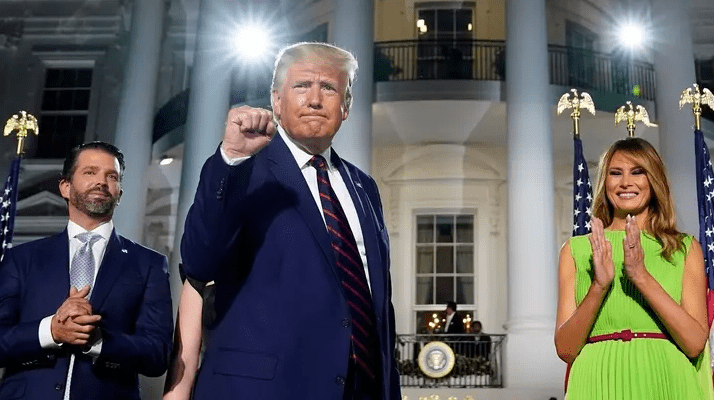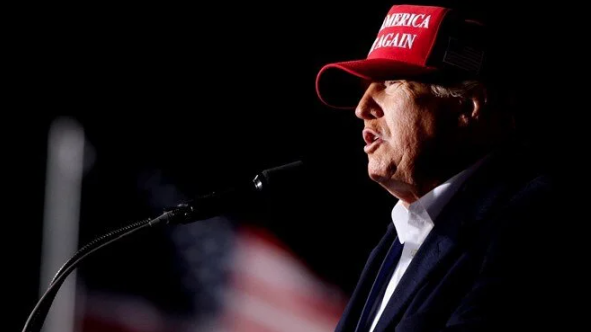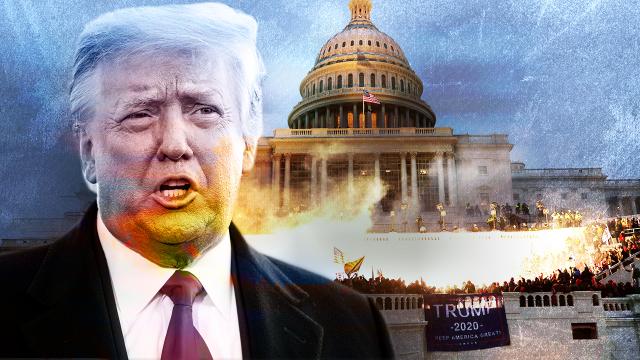President Donald Trump regularly instructed John F. Kelly, his second White House chief of staff, that he wanted the IRS to investigate a number of his perceived political opponents while in office, Kelly claimed.
Kelly, who served as Trump’s chief of staff from July 2017 to the end of 2018, told The New York Times that Trump’s demands were part of a larger pattern of him attempting to use the Justice Department and his presidential authority against people who had been critical of him, including attempting to revoke the security clearances of former top intelligence officials.
Kelly stated that former FBI Director James B. Comey and his deputy, Andrew McCabe, were among individuals Trump urged “we ought to investigate” and “get the IRS on.” His depiction of Trump’s intent to use the IRS against his opponents follows the Times’ report this summer that Comey and McCabe were both chosen for an unusual and very invasive examination by the IRS in the years after Kelly departed the White House.
Trump has stated that he is unaware of the audits. The IRS has requested its inspector general to look into the matter, and authorities have stated that the two men were chosen at random for the audits.
Kelly stated that he informed Trump that his request raised major legal and ethical concerns. Despite the president’s professed intention to have Comey and McCabe investigated by the IRS, he believes he persuaded Trump during his term as chief of staff to forego pursuing such investigations.
Following Kelly’s departure, Comey was notified in 2019 that his 2017 returns were being examined, and McCabe was informed in 2021 that his 2019 returns were being audited. The IRS was managed by a Trump political appointee at the time of both audits.
Trump frequently made his demands in response to news reports in which he believed his perceived enemies harmed him. The president would insist on having them investigated to the point where Kelly felt compelled to inform the president that what he desired was highly problematic, explaining in sometimes heated conversations that what Trump desired was not only potentially illegal and immoral, but could also backfire on him.
Trump would eventually abandon the idea, according to Kelly, but during subsequent outbursts about his enemies, he would bring it up again.
Throughout his presidency, Trump frequently railed against Comey, whom he fired in May 2017, and McCabe, who played a key role in the investigation into the Trump campaign’s ties to Russia.
Kelly said that along with Comey and McCabe, Trump discussed using the IRS and the Justice Department to investigate former CIA Director John O. Brennan; Hillary Rodham Clinton; Jeff Bezos, the founder of Amazon and the owner of The Washington Post, whose coverage often angered Trump; Peter Strzok, the lead FBI agent on the Russia investigation; and Lisa Page, an FBI official who exchanged text messages with Strzok that were critical of Trump.
“The U.S. government, whether it’s the IRS or the Justice Department, should never be weaponized or used to retaliate, and certainly not because someone criticizes you in the press or is your political opponent,” Kelly said in response to questions. “The average federal employee or FBI agent or IRS agent goes to work and executes the laws and regulations and shouldn’t be put in this position.”
A spokesperson for Trump denied that the former president had ever discussed using the IRS.
“It’s total fiction created by a psycho, John Kelly, who never said this before, and made it up just because he’s become so irrelevant,” said the spokesperson, Liz Harrington.
Kelly, who also served as Trump’s first homeland security secretary, was Trump’s longest-serving White House chief of staff, a role in which he brought a semblance of order to an often chaotic West Wing. Unlike many former top Trump administration officials, Kelly has said little publicly since Trump left office and not written a book.
But in response to repeated questions over months, Kelly said he chose to respond now because Trump had publicly claimed last week that he had used the Justice Department and the FBI to help Gov. Ron DeSantis win election in Florida in 2018. Kelly, who was Trump’s chief of staff at the time, said Trump never made such a request. If he had, Kelly said, it would have been an improper use of the Justice Department and the FBI.
Kelly’s remarks are among the most scathing from a former high-ranking official regarding Trump’s efforts to utilize government power for his personal objectives, and they come just days before Trump is set to declare his next presidential bid.
Other public revelations and former Trump advisers have supported his account of some of Trump’s requests, including his attempt to use the Justice Department against his adversaries and to withdraw security clearances for former officials.
Kelly said that after he initially started working for Trump as his chief of staff in July 2017, he was surprised that Trump actually thought he would follow through on what the president wanted.
“He initially thought I would do it,” Kelly said. “He thought I would be loyal and obedient to him. I told him we were loyal to our oath to the Constitution.”
Kelly said Trump had no appreciation for that concept and continued to push him and others to do what he wanted.
“If he told you to slit someone’s throat, he thought you would go out and do it,” Kelly said.
Kelly said he would tell Trump why using the powers of the federal government for his political ends was morally and legally problematic.
“I would say, ‘It’s inappropriate, it’s illegal, it’s against their integrity and the IRS knows what it’s doing and it’s not a good idea,’” Kelly said he told Trump.
“Yeah, but they’re writing bad things about me,” Kelly said Trump told him.
Among other steps sought by Trump, Kelly said, was the revocation of security clearances for officials from the George W. Bush and Obama administrations who had gone on to be critical of Trump on television. Among them were Brennan; James R. Clapper Jr., the former director of national intelligence; Michael Hayden, the former director of the CIA and the National Security Agency; and retired Adm. William H. McRaven, the former head of the Special Operations Command.
“I don’t want them making money,” Kelly said Trump told him.
Kelly said that during his tenure, the officials’ security clearances remained intact.
In refuting the claim by Trump that he had used the Justice Department and the FBI to help DeSantis when he faced a potential recount in 2018, Kelly said no such request had been made to the Justice Department or the FBI. In fact, Kelly said, Trump was growing increasingly disillusioned with DeSantis at the time. That fall, DeSantis had distanced himself from Trump’s public claim that Democrats inflated the death toll in Puerto Rico from Hurricane Maria.
“He was insufficiently impressed with DeSantis’ loyalty to him,” Kelly said.
Trump never made any secret of his belief that he could use his government powers to his political ends, frequently saying in public that the Justice Department should investigate his enemies and that the former intelligence officials should not have clearances. Congressional and Justice Department investigations, news media accounts and books about the Trump presidency have also shown that Trump tried behind closed doors to use the powers of the Justice Department against his enemies.
But far less is known about how he tried to weaponize the IRS.
Trump was familiar with how IRS audits functioned. In the closing year of his presidency, he remained engaged in a decadelong audit battle with the agency over the legitimacy of a $72.9 million tax refund that he claimed, and received, after declaring huge losses. (The current status of the audit is not publicly known.)
It is against federal law for executive branch employees — including the president, the vice president or any other White House official — “to request, directly or indirectly” that anyone at the IRS conduct an investigation or audit of any taxpayer.
The Times reported in July that between 2019 and 2021, when the IRS was being led by Trump’s appointee, Comey and McCabe were subjected to the same type of rare audit that is so invasive it is known among tax lawyers as “an autopsy without the benefit of death.”
IRS officials have insisted that the men were randomly picked for the audit and that there were no political motivations behind how they were chosen. Out of the 153 million returns filed for the year Comey was audited, only 5,000 tax returns were targeted for the audit. For the year McCabe was audited, 154 million people filed returns and 8,000 were selected for the audit.
Kelly said that Trump was particularly “obsessed” with McCabe’s wife, Jill, who had run for Virginia’s state assembly around the time the FBI was investigating Clinton’s use of a personal email account. Trump has repeatedly made the false claim that Jill McCabe, a Democrat, received money for her campaign directly from the Clintons.
“That was proof McCabe hated him,” Kelly said.
Trump regularly attacked Comey and Andrew McCabe in public when he was president. He called Comey a “dirty cop” who “should be tried for treason” and “should be arrested on the spot!” He also accused McCabe of treason.
By the conclusion of Trump’s presidency, the Justice Department and its inspector general had investigated Comey, McCabe, Strzok, and Page in a variety of topics, but they had never been charged with any crimes.
Trump voiced public concerns about McCabe’s income a year before the audit began.
“Was Andy McCabe ever required to repay the $700,000 unlawfully paid to him and his wife by Crooked Hillary Clinton for his wife’s political campaign while Hillary was under FBI investigation and McCabe was the head of the FBI?” Just curious. In September 2020, Trump tweeted.
The source used in the preparation of the article: The New York Times / Yahoo





